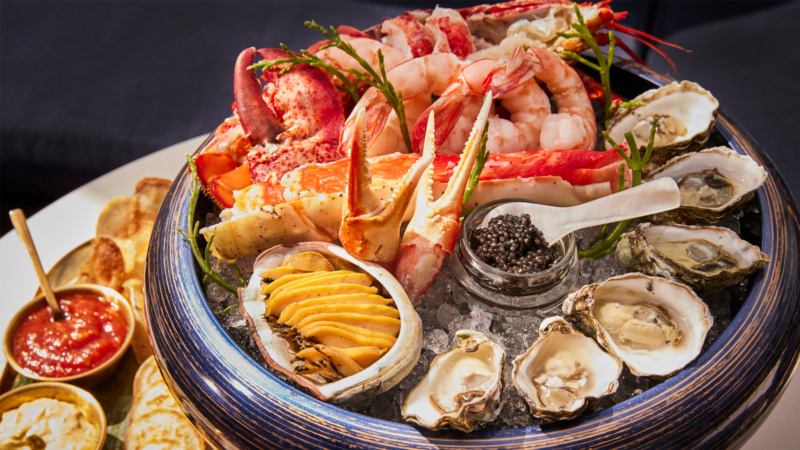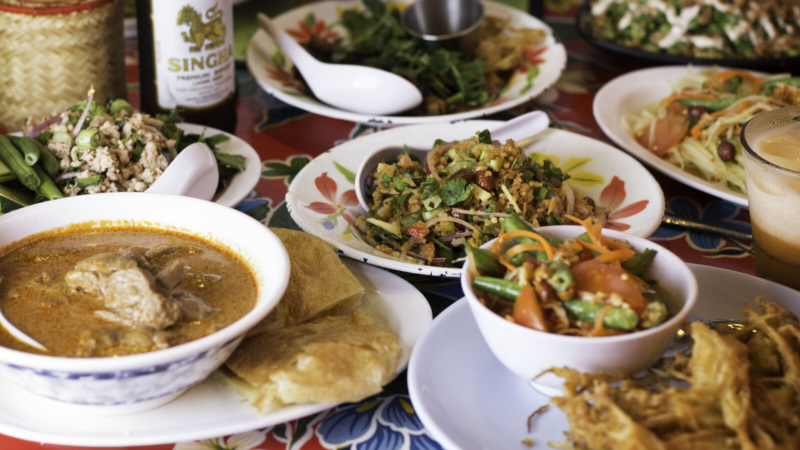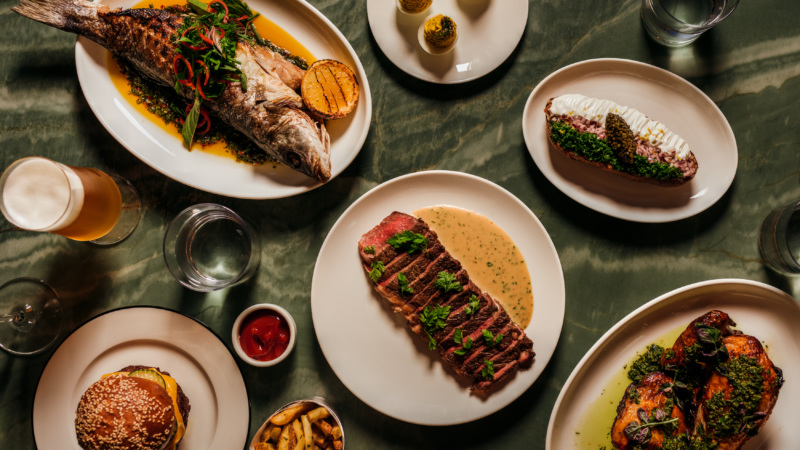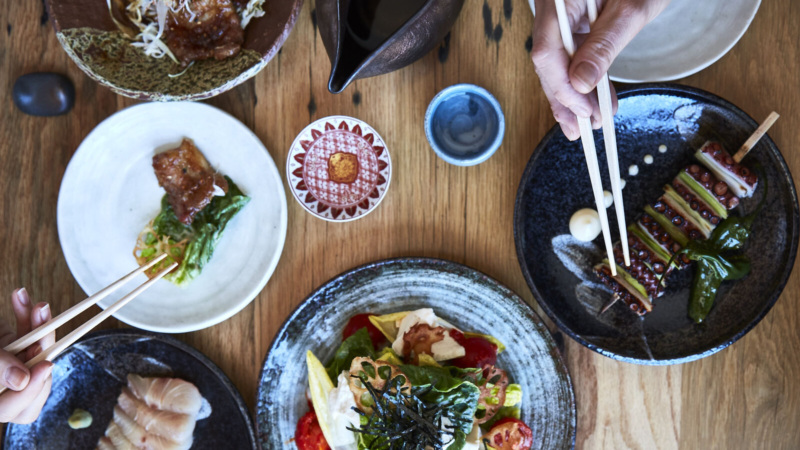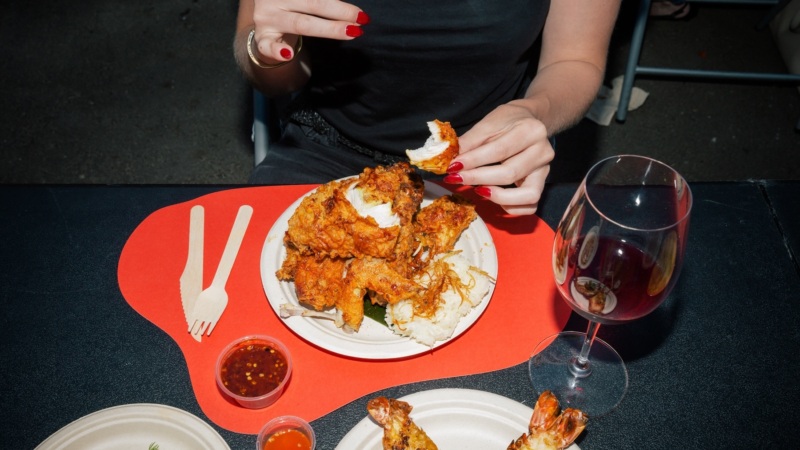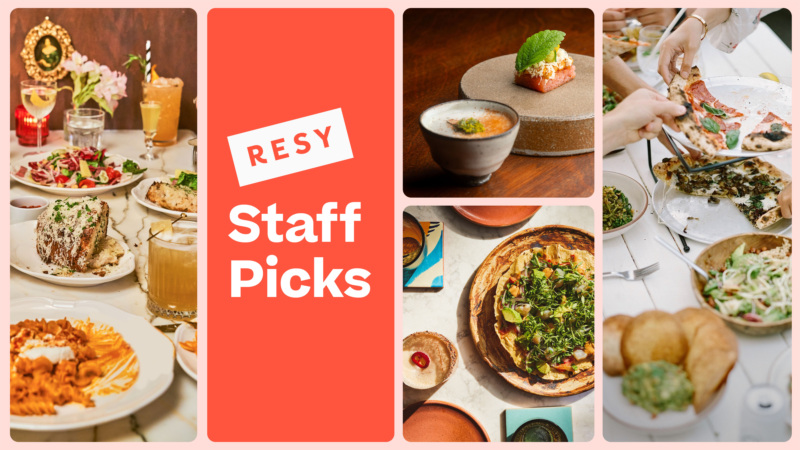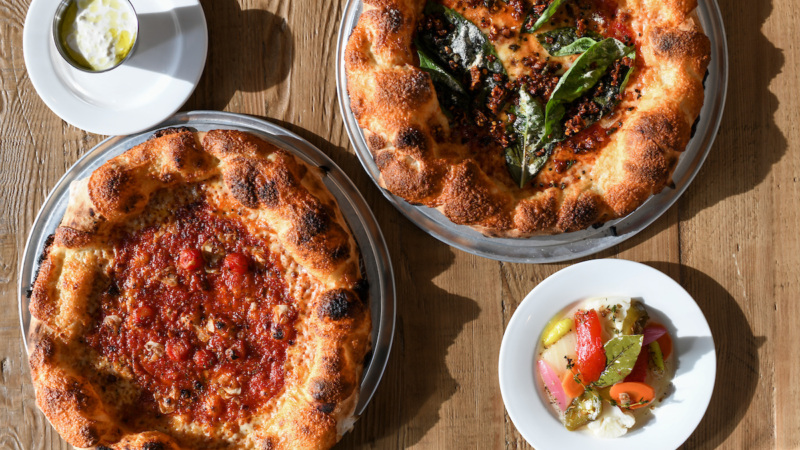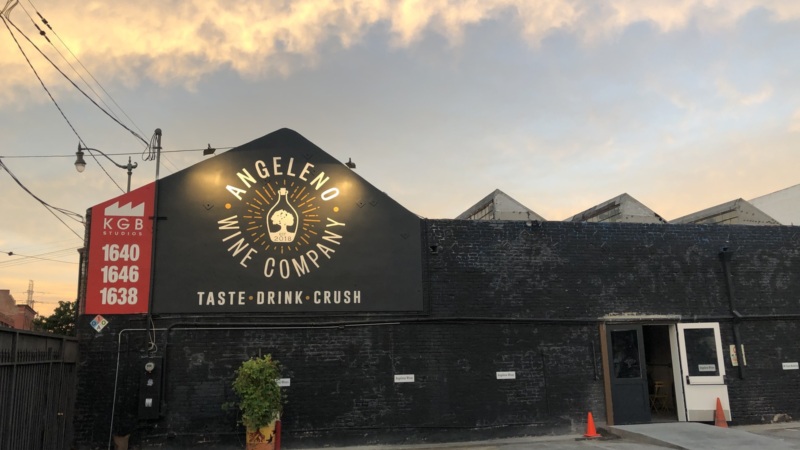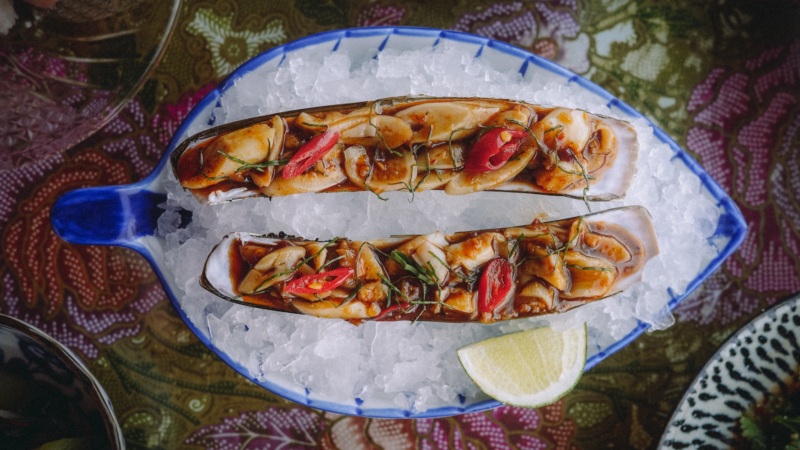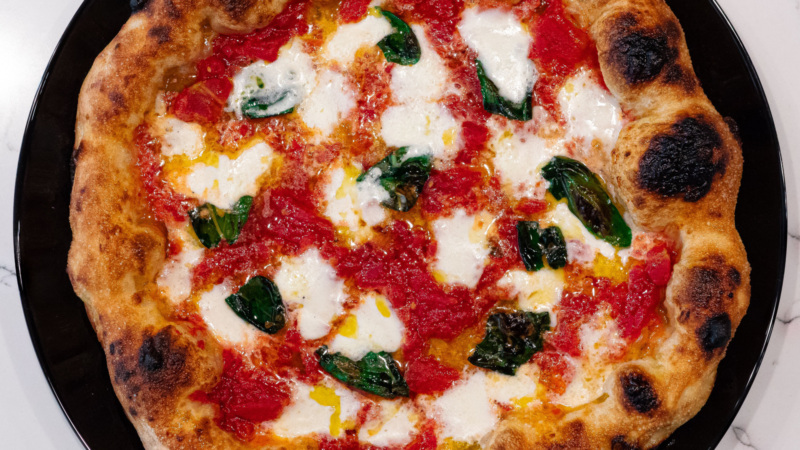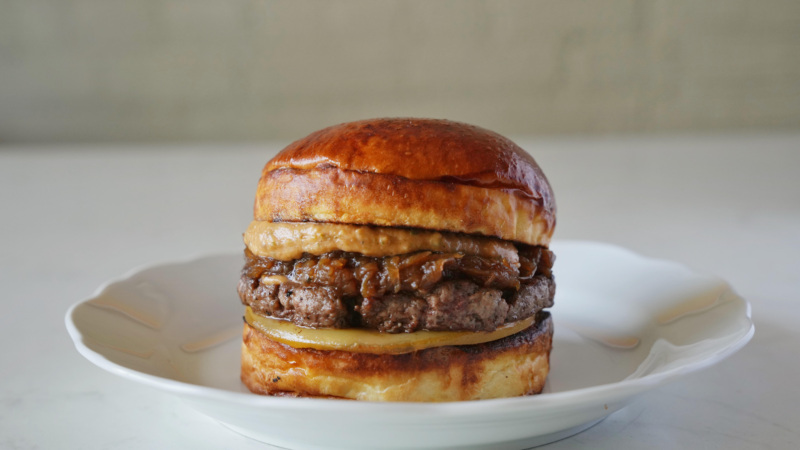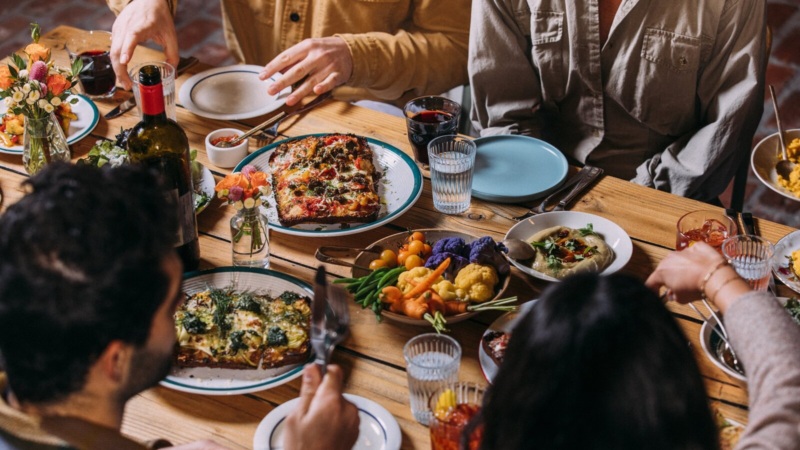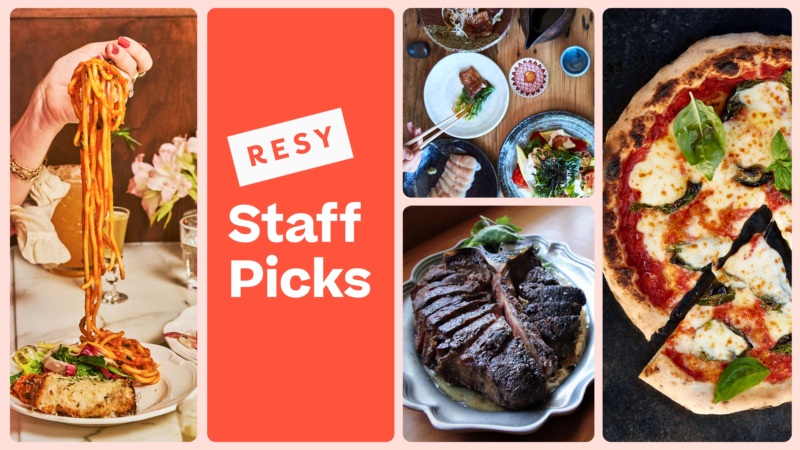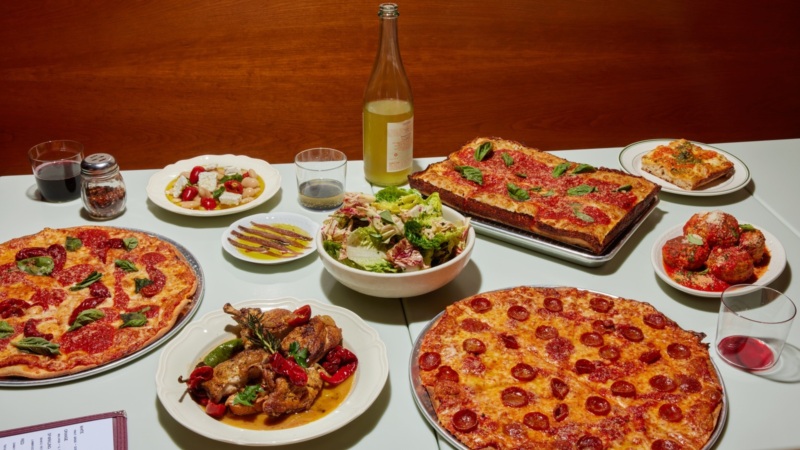
The Duo at Kismet Has Seen the Future, and It Will Be Better
In Arabic, the word “kismet” means destiny, which is fitting for Sara Kramer and Sarah Hymanson’s popular Los Feliz restaurant. Kismet feels like it’s exactly where it’s supposed to be.
In 2015, the two Brooklynites waltzed into L.A. with a notable following, first opening a small falafel counter, the now-shuttered Madcapra, in the Grand Central Market. They partnered with Jon Shook and Vinny Dotolo to open Kismet soon after, which became the beating heart of Kramer and Hymanson’s soon-to-grow empire.
The restaurant immediately garnered high praise — especially from the late restaurant critic Jonathan Gold, who launched it into the echelon of his must-try lists for dishes layered with Middle Eastern flavors and California ingredients that make everything sing. It’s the modish, vegetable-forward neighborhood spot that locals are happy to have within walking distance, and one visitors are happy to seek out.
Kismet quickly became a haven for quiet breakfasts of shakshuka and platters with flaky bread, soft-boiled eggs, labneh, and tomato. In the afternoons and evenings, regulars clamored for slabs of marinated feta, crispy rice, lemony chicken and pine nut pies, clams in Meyer lemon broth, and that famous rabbit feast for two. The excellent wine program leaned toward natural and biodynamic picks before the trend took hold of every restaurant in town. And incredibly gorgeous desserts from pastry chef Meadow Ramsey deserve their own Instagram account.
Two months before the pandemic crushed the restaurant industry, Kramer and Hymanson opened Kismet Rotisserie a few doors down Hollywood Boulevard, a takeout concept that elevates the roast chicken genre to new levels. They swear by their brining and secret spice mix that results in one of tastiest, golden brown-skinned birds in town. And sides like schmaltzy potatoes, velvety hummus, and housemade pickles are practically mandatory.
It’s the kind of concept that seemed built for pandemic-era dining: A quick takeout spot that offered crowd-pleasing ready-made meals fit for families and solo diners alike. It was especially busy while Kismet, the original, remained closed for in-person dining most of the year. While it served as a marketplace for weekly farm boxes, wines, and other goods, the duo finally brought it back for at least outdoor dining, welcoming happy regulars and new fans once again.
We sat down with Sara Kramer, one half of the duo — it’s increasingly difficult to get both of the working chefs at the same time — to talk about some of those pandemic pivots, her inspirations, and what the future holds for Kismet, their dedicated teams, and the restaurant industry as a whole.
This interview has been lightly edited for length and clarity.
RESY: You’ve always included innovative plant-forward dishes at your restaurants. Can you talk about that ethos and how that philosophy influences how you develop your menus?
Kramer: I feel like people often overlook that stylistic choice about our restaurant because they more often focus on where the flavors are inspired from. But to be honest, it’s one of the most central core beliefs that Sarah and I both share, and one of the choices that we feel most strongly about.
We come from backgrounds where we’ve both been vegetarian or vegan at different points in our lives, so it’s coming from a sustainability stance that we both strongly believe in. We’ve never served beef or pork at Kismet, and that’s intentional. We try to stay away from the bigger high-impact animals. We don’t want to be staunch about it, but we don’t feel like we’re losing anything by not including it.
We do serve smaller animals, like rabbit, chicken, and lamb, but Sarah and I have always thought about animal protein as a bit more celebratory. We feel, from a sustainability standpoint, that vegetables and plant-based food should be at the center of the plate, and that meat and animal protein should generally be there to provide some flavor and color. It should be the accent rather than the main event.
We’re just aiming for balance. We have the rabbit dish, which is a real celebration of the animal and that’s been on our menu since the beginning, but it’s also half a rabbit with so much other food that it introduces a lot of plant-based options into that meal.
How has Los Angeles influenced how you cook and your menu?
We are absolutely from the East Coast, so we don’t want to forget that because we love it, and it’s a huge part of what made us who we are. Los Angeles has really influenced us because we have such incredible access to and constant availability of incredible produce here, where the seasons are much less stark than back east. For that reason, it’s so luxurious out here. It gives us the opportunity to work with more things during many different times of the year as opposed to having prescribed types of vegetables at a given time of year. And we try to showcase that on our menu as much as possible.
Earlier this year, you offered a virtual cooking class so we could all learn to make your beloved lemony chicken pies. Why was that important?
We decided to do that because those pies are one of our most popular signature menu items. They’re crowd-pleasing, they’re great for kids, and it’s really a fun activity to teach because people don’t have a lot of familiarity with working with phyllo [dough], so it’s a fun interactive demo and you can do a lot of the work together. It’s all really visual, it’s not just chopping, and the phyllo part is really fun. Part of what we want to do is introduce people to working with phyllo, and then tell them about some plant-based options. You can make them with mushrooms, grains, and other vegetables.
We’re going to start producing short-form demos, a more behind-the-scenes look at what we do. They’re meant to be a little bit of inspiration. For example, we’ll show you how you can use your leftovers from Kismet Rotisserie. For me part of the joy of getting a whole chicken is what you can do with the rest of it the next day, and the next day. That’s a fun angle for us because it’s about the food that we serve and the life it can take on.
This past May you announced your mutual decision to split with Jon and Vinny. What spurred that decision? What does that mean for you and Sarah now that you will be independent business owners?
The decision was the right one for everybody. Sarah and I are excited to take full control of our own businesses and grow our company from our perspective. Jon and Vinny have had the opportunity to grow their business in the way they wanted to, and they have obviously done that very successfully. We just wanted the same opportunity to grow our business the way we are inspired with our perspective, and that’s why we split. They gave us a huge opportunity and we’re grateful to them, but it felt like it was time for all of us to move on. We think it’s a positive shift.
In terms of moving forward, I think there will be some expansion on the horizon, particularly of the Kismet Rotisserie brand, and we will continue to focus on making Kismet the great dining experience that it’s always been.
I know we never ask men this question, but since female restaurateurs are still in the minority — fewer than 7% of kitchens are run by female chefs — what does it mean to be an outfit owned and operated by women?
More specifically than us being women, what’s more important to Sarah and I is creating an inclusive environment for everyone who works for us. That’s always been a top priority in terms of how we run our company. We want to create as much equity as possible for all the people who work for us. We also emphasize to our employees that we have an open-door policy about anything related to their experience here. We’ve actively tried to make sure everyone has an opportunity to be seen and heard and that’s important to us. These values aren’t necessarily different from how other people run their businesses, but it’s at the top of our priority list and it’s how we want to envision the future of the Kismet world.
What are some of Kismet’s policies that align with this ethos of equity?
Pre-pandemic, we used to collect a 20% service charge, but we’ve stopped doing that. We felt like the model we moved into, collecting regular tips, and distributing equally among the entire hourly staff according to hours worked, has been a much more successful strategy for actual full pay equity.
It means that everyone, including dishwashers, line cooks, and front of house, ends up making a much higher hourly wage. There isn’t a disparity anymore at either of our restaurants between the hourly wage between back of the house and front of the house, which, from our perspective, is an incredible situation. That is one of the biggest longstanding problems that exists in the hospitality industry.
Even before the pandemic, 2020 was intense for so many reasons, the politics, the social, racial, and economic reckoning in the food world. I’m wondering how you two as influential Los Angeles restaurateurs dealt with that in your business. Did you make any changes or institute any new policies?
It’s a huge relief to see better results with our new tip policy. And on the whole, it’s been a crazy hard time. The way we’ve dealt with it: We’ve just kept our heads down and worked very hard alongside our team. Sarah and I have been at the restaurants almost every day, and that has been very important during this time. We want to do as much to lead by example as possible and make sure our staff doesn’t feel like they’re being sent in to work in a tenuous situation, that they know we’re willing to be there right by their side.
When it comes to the pandemic, we tried to be conservative. We never reopened for indoor dining even though it’s been allowed, and we’re still just offering outdoor dining. We’re doing everything we can for the safety of our staff and our employee’s sake and don’t want to prioritize the potential financial gain of that over everyone’s comfort and safety.
COVID shined a light on the food insecurity our restaurant workers face when they can’t access family meals or work to make enough money to buy food. Can you talk about some of the things you did to support your staff?
We always offer a 50% discount to all our employees on dining at either of our restaurants or for takeout. But during the pandemic, we changed Kismet into a goods shop, so we offered that for the goods store as well, which basically allowed them to buy groceries at cost. Everyone should know that when you’re buying things at cost, at wholesale, it’s a lot lower than even when you buy things at a retail store, and certainly much lower when you buy anything on-line. That was a big boon for our employees.
We also donated to No Us Without You, a great organization doing wonderful work here in Los Angeles, and did fundraisers that supported them. We did charity meals for hospital workers, and we tried very hard to keep everyone employed and safe. We continued to provide family meal. Anybody who wanted to come back to work was offered their job back. We never furloughed the Rotisserie staff. They were able to stay working the entire time, and the Kismet staff who we furloughed in March had their jobs back six weeks later.
Have any of the pivots you’ve had to make in the last 18 months been positive for you as chefs personally or your staffs?
I think for as painful as this time has been there has been a lot of positive things to come out of it. It’s pushed the industry in a more equitable direction, which I think can only benefit the industry even if there are some growing pains. I think the more we can make this an industry that serves the people who work in it, and not just some of them, the better the future of the industry will be.
I also think the pandemic has made everyone aware that we need to create spaces in our industry that are not abusive. That’s been a slow-moving change, but the pandemic really pushed it forward in a way nothing else would have. It would have continued to be a slow burn but the pandemic accelerated things, which I think is positive. So, I am cautiously optimistic that the restaurant industry will look better than it did before.
You and Sarah launched Kismet with that glowing Jonathan Gold review in 2017. Since then, how has the restaurant landscape changed, and what do you think we can expect from the industry going forward?
I do think there will be more diversity, and I think that’s great. There’s more room for different kinds of restaurants, whatever form they come in. I love that there have been lots of successful pop-ups and start-ups during this time, and I hope that continues and those businesses flourish.
I’m excited about any kind of food if it’s well executed and thoughtful and made by people who care. For me it’s more about that than anything. What I don’t want is for corporate ghost kitchens to take over and become the new reality. Hopefully everyone pays attention to where they are getting their takeout from.
Stacie Stukin is a culture essayist and journalist who writes about food, design and art for publications like Architectural Digest, Los Angeles Magazine, Vegetarian Times and the Los Angeles Times. Follow her on Twitter and Instagram. Follow Resy, too.



